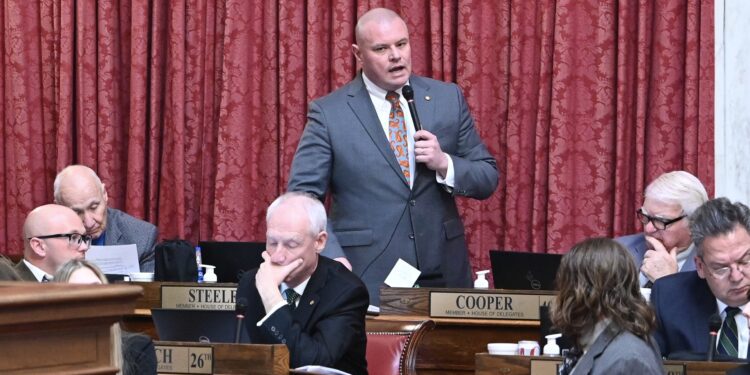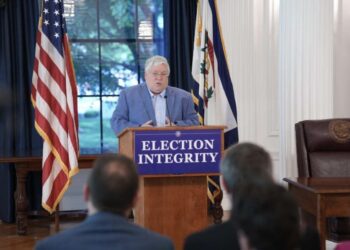CHARLESTON, WV (LOOTPRESS) – The House of Delegates convened Wednesday to discuss several bills, but it was House Bill 2613 – relating to the administration of anesthesia – which generated the most discourse during the session.
Introduced on January 17, 2023, HB 2613 would amend and reenact §30-7-15 of West Virginia code to allow for the administration of anesthesia by a certified registered nurse anesthetist (CRNA) in cooperation with a physician, podiatrist, or dentist.
The change would require qualifying nurse anesthetists to be licensed to practice as a registered professional nurse and as an advanced practice registered nurse under the terms of the state article.
Additionally, nurses would be required to have successfully completed the educational program of a school for nurse anesthetists accredited by the Accreditation of Nurse Anesthesia Educational Programs, and be board certified as a certified registered nurse anesthetist by the National Board of Certification and Recertification for Nurse Anesthetists.
The lead sponsor for the bill is Amy Summers (R – Taylor, 073,) who herself worked as a Registered Nurse, having earned a B.S. in Nursing from West Virginia State University and an M.S., Nursing, Leadership and Management, Western Governors University.
Assistant Majority Whip Delegate Adam Vance (R – Wyoming, 035) offered a hypothetical scenario in which during a C-Section situation a spinal block required care, querying whether, through passage of this bill, a nurse would be able to provide care in such a situation without an anesthesiologist present.
Delegate Summers clarified the distinction between a nurse and a nurse anesthetist with regard to what the bill would permit but did confirm that a nurse anesthetist would be permitted to provide care in such a situation through this bill.
“Not a nurse, no, but a certified registered nurse anesthetist who has much, much more training – yes – without the presence of the actual anesthesiologist, that is correct,” said Delegate Summers.
Speaking to the bill, Delegate Vance urged rejection on the basis of the specific level of training required of the anesthesiologist and the potential risk of letting a less qualified individual intervene in delicate medical situations.
“I urge that we reject this bill for the simple fact that an anesthesiologist is trained to be at that special level of being able to administer the care. I’m not taking anything away from the nurses, but [an anesthesiologist] does have a doctor’s degree in that, and I think that he should have to say so in that as well,” said Delegate Vance, going on to speak on his own experience in high-stakes medical scenarios.
“My wife has had three C-sections, and one little slip up could’ve caused her to be paralyzed on spinal blocks or epidurals, so I urge rejection on this bill.”
Delegate Brandon Steele (R – Raleigh, 042) acknowledged his own experience as a patient in his consideration of the bill, asserting that the comprehensive background of a certified anesthesiologist in the room had not only provided him with peace of mind, but had also afforded his own care providers the understanding to effectively navigate unanticipated developments in an unpredictable medical situation.
“This bill is a little bit personal to me,” Delegate Steele began. “I had to have surgery on both of my patellar tendons simultaneously a couple years ago. It was supposed to be a 2 ½ hour surgery, and when the surgeon opened my knees up, he realized the damage was far, far worse than what he had originally anticipated. It turned into a 5 ½ hour surgery from a 2-hour surgery, and beside me that whole time was an anesthesiologist. This was during COVID, but fortunately I was somewhere where a seasoned anesthesiologist was watching over me. He had to make a lot of changes in the middle of that surgery to take me from 2 hours to 5 ½ hours. This is a delicate science, it’s not an exact science. It’s probably one of the more difficult areas of practice for a physician.”
Delegate Steele also touched on an example from a local area, which became the subject of national news. In this scenario, improper administration of anesthetic led to unfathomably dire consequences for a beloved member of the community.
“There was a preacher in Wyoming County, and I knew him, his name was Sherman Sizemore. He went in for a heart surgery years ago. He had been a preacher for 45 years, preaching at a little church in Herndon, WV. Sherman went in – he was a great man of God, and everybody loved him – He went under the knife for a heart surgery, his open-heart surgery that lasted, I believe, around 3 hours, maybe more than that.
As he was put under, he was administered the anesthesia that rendered him unable to move or communicate, but he was not administered the anesthesia that put him to sleep.mSo he spent the next hours watching himself be operated on with his chest completely open. It drove him mad. After he was revived, he let them know about it. They checked everything, and yes, there was an issue, and he was not administered the anesthesia that would have put him under, so to speak. So right there, helpless for hours, watching himself be operated on – it drove him mad.
This great man of God – a pastor at church for 40 some years in Wyoming County, that everybody loved, nobody could say bad thing about – committed suicide in his 70s because he was just driven mad.That’s what we’re talking about here today,” Delegate Steele continued, insisting that the residents of West Virginia be afforded that right to choose with regard to their own medical care.
“When I think about myself laying in that hospital bed during COVID, I couldn’t have family come in. I was there alone; I was in the hospital for weeks; I was in a wheelchair for months; I was helpless lying there. If I had shown up for that surgery and a nurse was there to administer it, not a physician – what would have happened if I had requested, ‘no, I want a doctor.’ Would that have been honored? ‘No, we don’t have to do that. The nurse is fine.’
I didn’t have my family there advocating for me. I didn’t have anyone. No one was allowed to be there, I was there by myself. I think about people that may not be as vocal as me or may not be able to voice an objection as well as I can, that your vote today is for them to be able to voice that objection. So many people are showing up to the hospital, they don’t have the capacity to voice an objection, and today we’re being asked to take that away from him. I’m asking you tonight, for people just like me, give them that voice back. Just looking at the public opinion of this and what we have, I just think it’s a little too dangerous and I can’t support it.”
Speaker Pro Tempore Paul Espinosa (R – Jefferson, 098) acknowledged that, while most patients would indeed prefer to have access to the highest care possible, this access may not necessarily be a possibility within the state due to lack of active healthcare professionals throughout West Virginia.
“I think most of us probably would like to have an anesthesiologist available if possible, if it was warranted. But it doesn’t look like that’s really the reality in West Virginia,” Delegate Espinosa stated, requesting further information regarding these resources.
“13 hospitals in our state do not have an anesthesiologist,” said Deputy Speaker Delegate Matthew Rohrbach (R – Cabell, 026,) pointing to a general lack of resources on that state level which regularly lead to the foregoing of an anesthesiologist’s expertise regardless.
“I suspect, frankly, most of them are places that an anesthesiologist probably can’t go and be financially viable. Now that’s the reality of where we live, folks. Some of us don’t represent rural districts. An awful lot of the people sitting here getting ready to vote on this do. So the reality is 13 hospitals in this state that perform surgery do not have anesthesia through an anesthesiologist, and I think it’s unlikely that this is going to change any of that. So, what we’re really doing is codifying what we’ve already been doing the last three years under executive order.”
Delegate Joe Ellington (R – Mercer, 038,) himself a practicing Physician who earned his PhD from Duke University brought an internal perspective to the idea presented in the bill and spoke of the long-term implication of its potential implementation.
Specifically, Delegate Ellington acknowledged that the numbers of anesthesiologists throughout the State of West Virginia – which are generally already too low for adequate care to be provided in a great many regions – would dwindle further with the certification no longer being necessitated in order to perform the function of the position. Furthermore, it was pointed out that the passage of the bill could exacerbate the already strenuous care situation impacting rural areas in which medical facilities are struggling to fill their ranks.
“The concern I have is, you’re going to have all these hospitals start saying ‘we’re not going to have an anesthesiologist covering this, we’re supervising it.’ The only place that you’re going to have in the next 10 years are probably the teaching and tertiary centers in the state, and it’s hard to recruit people to get back here,” Ellington said. “You’ll see this expand and that’s my prediction for that, and I just want you to take that in consideration.”
Notably, while Delegate Ellington did not discuss what his vote on the bill would be and made apparent that he was not attempting to influence other Delegates’ decision in any capacity, he himself would ultimately vote against HB 2613.
Delegate Summers addressed her fellow Delegates at the close of debate on the bill stating,
“I’ll just say one thing, in my 37 years of experience as a nurse, I could tell you all kinds of stories to support whatever position I want to support. But that’s not what this bill is about. All this bill is about is making our laws be in alignment with what the CNA’s are trained to do. I’m just asking that we push green to align their scope with our laws.”
House Bill 2613 was ultimately communicated to the Senate upon passage through the House with 77 yeas, 21 nays, and 2 voting Delegates counted as absent from the proceedings.
Additional LOOTPRESS coverage of the ongoing sessions of the WV Legislature can be found here.









